EDIF 2025: A Milestone for Defence Cooperation and Future Innovation
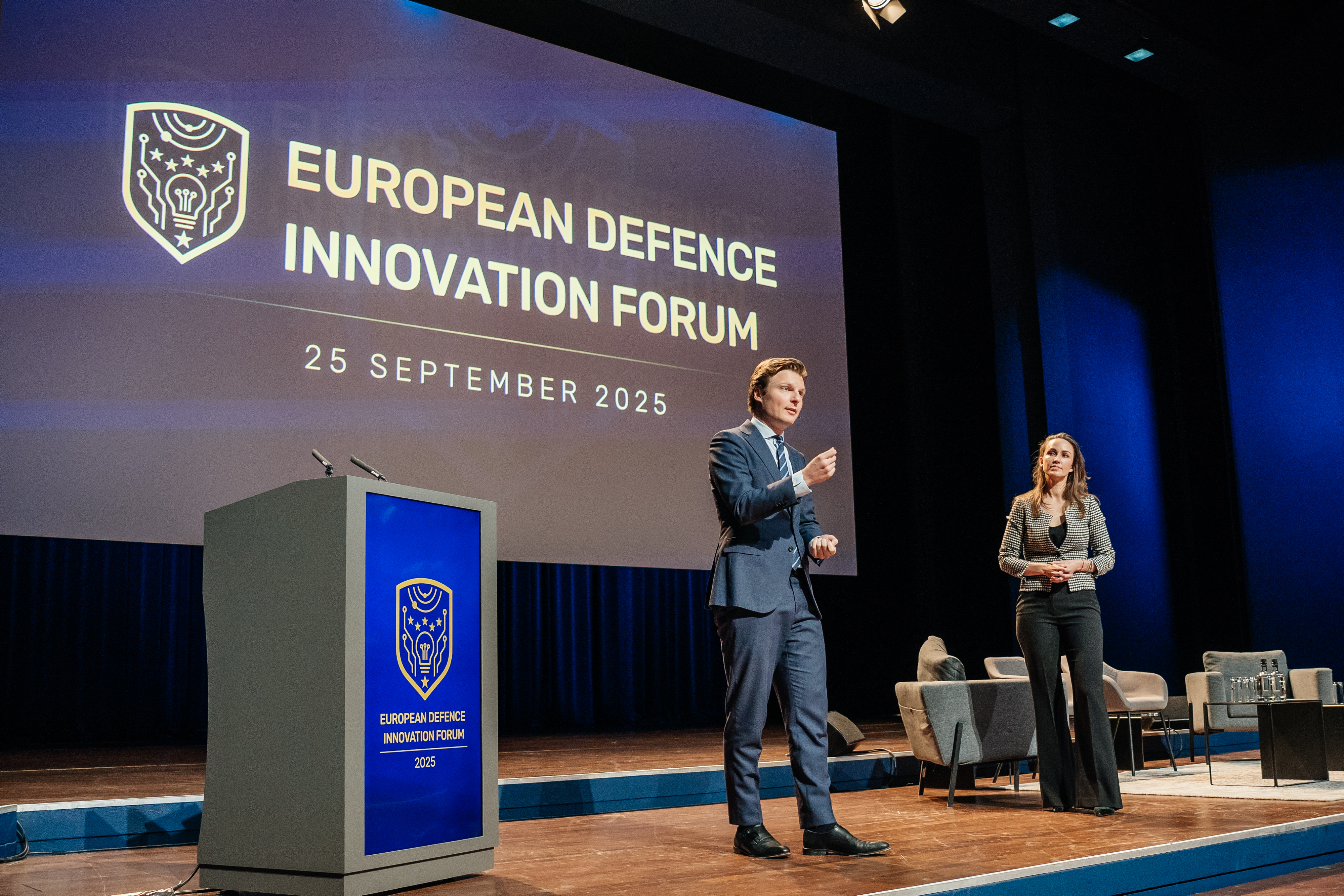
At the European Defence Innovation Forum (EDIF 2025) in The Hague, one message rang out clearly: international cooperation, innovation and speed are essential to building a more resilient and secure Europe. Representatives from industry, government, defence and knowledge institutions emphasised that only through joint effort can sustainable progress be achieved.
The day began with a brief introduction emphasising the importance of moving beyond discussion towards concrete actions. A moving moment followed as the event opened with a minute of silence to honour and remember those who fight every day for peace in Ukraine.
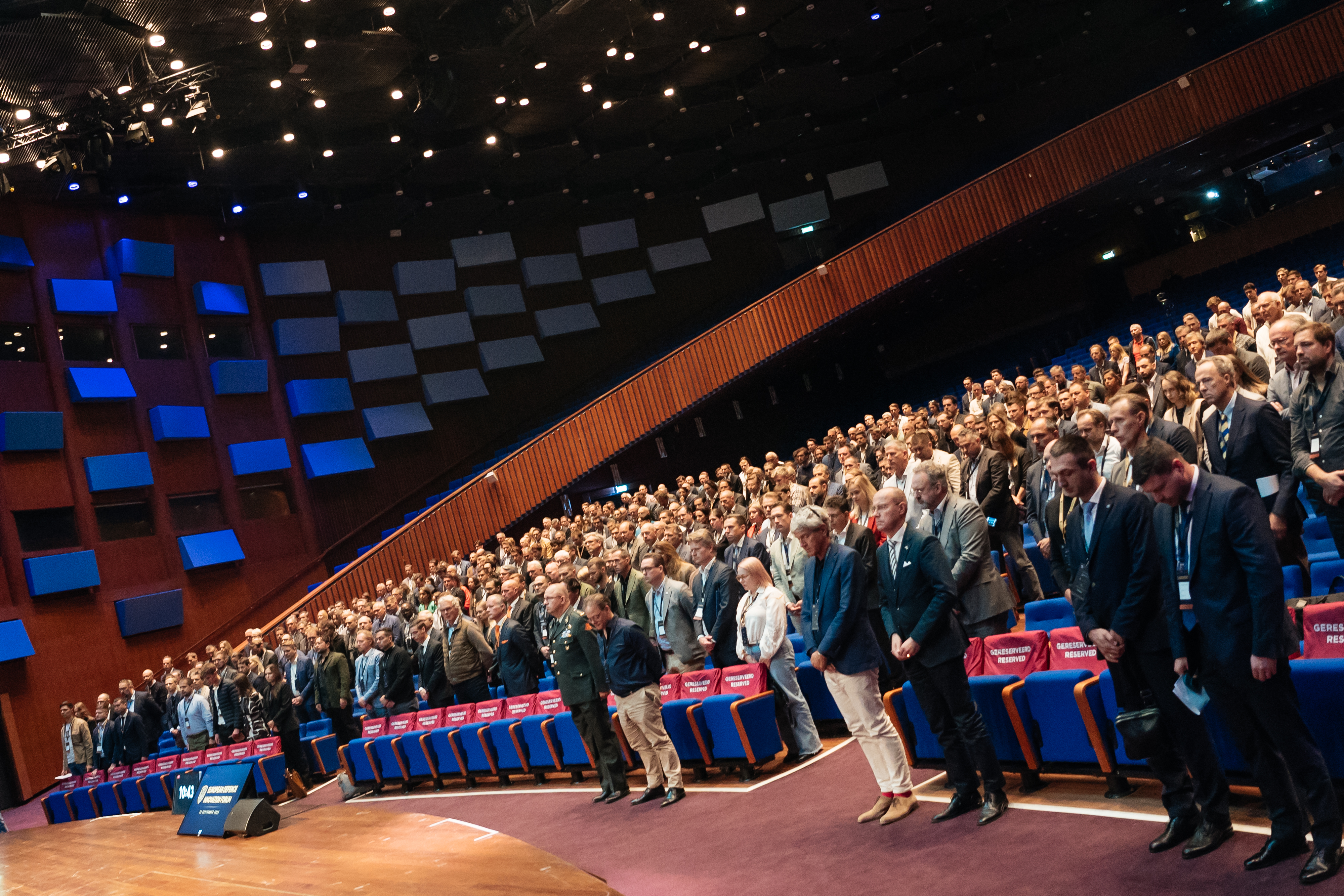 Audience in the minute of silence
Audience in the minute of silence
A Call for Collaboration
Deputy Mayor Saskia Bruines opened the event with a call for collaboration and momentum. She underlined that international cooperation is an essential condition and stressed the need to build on the momentum. The Hague was positioned as a hub for public-private defence innovation, where government, industry and knowledge institutions come together.Throughout the forum, the importance of an industry-led, government-facilitated ecosystem became clear. It is the close cooperation between all parties that makes real progress possible. This cooperative approach is also essential to turning priorities into action. Justice for Ukraine was cited as a core priority, with predictable multi-year funding seen as vital to ensure innovations can move beyond prototypes and into large-scale production.
From Battlefield to Industry
The war in Ukraine has accelerated the pace of change, making clear that innovation is no longer optional. The “battlefield-to-factory” approach where lessons from the frontlines flow directly into research, production and scaling was repeatedly emphasised as critical for delivering solutions that are both timely and effective.
Participants highlighted the importance of strategic focus and speed: defining where Europe needs full autonomy, where partnerships are essential and how procurement processes can be streamlined. A culture of “stop-loss” was recommended, ending underperforming projects early and freeing resources for high-potential initiatives.
Faster funding cycles were encouraged, recognising that an 80% solution today is often better than waiting years for perfection.
Emerging Technologies and Opportunities
Building on these strategic priorities, the sessions turned to technology. Across the sessions, drones and counter-drone technologies were highlighted as areas of enormous opportunity. Already proven on the battlefield, these systems were seen as prime candidates for accelerated development and industrial cooperation.
Other priority technologies included robotics, sensors, radar, space systems and AI. To fully exploit these areas, international agreements, early involvement in major development programmes and the integration of dual-use technologies were seen as essential steps towards achieving scale and competitiveness.
Export capacity was identified as indispensable, with harmonised regulations such as a trilateral export framework with Spain, Germany and France proposed to enable cross-border collaboration without unnecessary delays.
Dutch Defence Minister Underscores Urgency Ruben Brekelmans (Minister of Defence of the Kingdom of the Netherlands) and Nina van Lanschot (Moderator)
Ruben Brekelmans (Minister of Defence of the Kingdom of the Netherlands) and Nina van Lanschot (Moderator)
The presence of the Dutch Minister of Defence added both urgency and inspiration to EDIF 2025. His keynote speech underlined the scale of today’s security challenges and the critical role of industry, technology, and cross-border partnerships in meeting them. The address left a strong impact on participants, reinforcing a shared sense of urgency to accelerate innovation, cooperation, and implementation across Europe’s defence sector. He pointed out how Ukraine has become a laboratory for rapid innovation, particularly in drones and counter-drone systems, which have proven decisive on the battlefield.
“Peace through strength means working together to give Ukraine the tools to defend itself today while building Europe’s collective ability to prevent future threats tomorrow,” he emphasised.
Three key priorities emerged from his speech:
Becoming stronger through innovation, mass production and pooling resources
Becoming smarter by integrating cyber, AI, space, drones and quantum technologies
Acting together by breaking down bureaucratic barriers and forging long-term partnerships.
Building Partnerships, Breaking Barriers
Before the panel discussion, a powerful keynote set the stage with a compelling perspective on the growing defence-industrial partnership between the Netherlands and Ukraine. It highlighted how initial emergency support has evolved into long-term cooperation, co-production initiatives, and the Build with Ukraine programme. The call to remove bureaucratic barriers, accelerate innovation, and deepen industrial collaboration resonated strongly with participants.The central message was clear: every day at the front matters. Procurement, development and delivery cycles must be shortened. These themes translated into concrete contributions from industry representatives.
Industry Contributions and Innovation Loops
Industry speakers showed how to combine urgency with scale. They described a battlefield-driven feedback loop for drones: teams operate alongside Ukrainian units, feed real-time lessons into engineering and iterate quickly to produce tens of thousands of systems. Ukrainian joint ventures now maintain and will co-produce artillery systems, with combat use informing upgrades. The shared view: supporting Ukraine strengthens Europe’s own resilience and tech base.
The Netherlands Enterprise Agency (RVO) outlined tools for firms missions, matchmaking, innovation funding, and cluster support plus new initiatives to lower barriers for start-ups and dual-use scale-ups.
Ukrainian Perspective: Innovation from the Frontlines
A senior representative from Ukraine joined the forum remotely from Ukraine, sharing key insights on the rapid development of drone technologies, the value of battlefield experience and opportunities for international collaboration in production, training and innovation.
Participants expressed appreciation for the contribution, underlining its importance for strengthening collective security and defence cooperation.
Signing of Strategic Partnership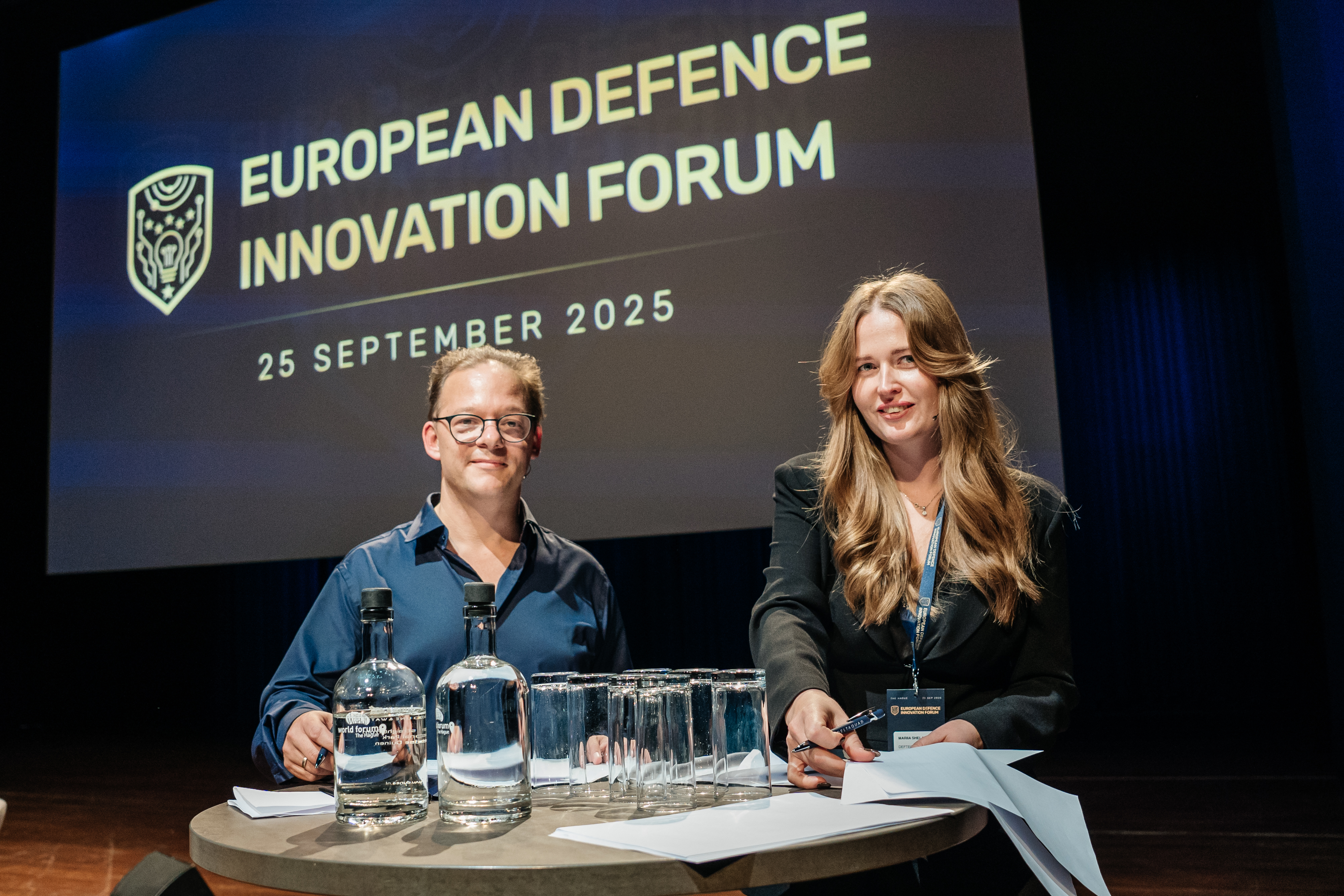 Sander Smeets (CEO of DeltaQuad and Board member of the Battlefield of Resilience Foundation) and Maria Shelasheva (founder of Deftechcluster)
Sander Smeets (CEO of DeltaQuad and Board member of the Battlefield of Resilience Foundation) and Maria Shelasheva (founder of Deftechcluster)
The programme’s momentum continued with the signing of a strategic partnership between the Dutch Battlefield Resilience Foundation and Ukraine’s Defence Tech Cluster, the importance of speed and innovation in modern warfare was highlighted.
The partnership is built on three pillars:
Data collection from the frontlines
Solution development to turn insights into practical systems
Fleet deployment to scale up proven solutions
This initiative represents a key step in strengthening defence innovation between the Netherlands and Ukraine, combining expertise to support Ukraine while boosting Europe’s resilience.
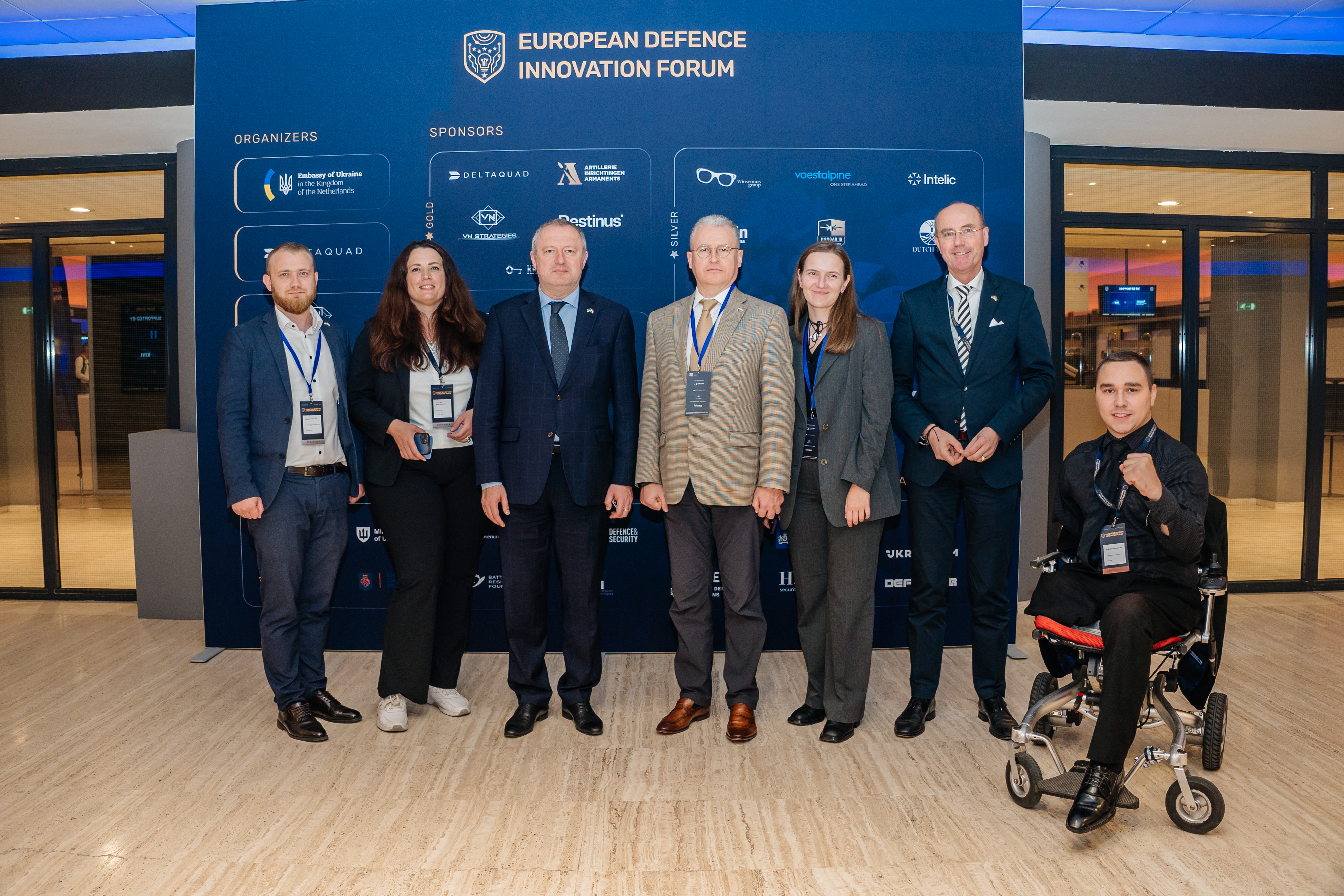 Valerii Motylov (Diplomat at The Ministry of Foreign Affairs of Ukraine) Nataliya Nakonechna (organiser EDIF, VN strategies), Anatolii Solovei (Deputy Head of Mission, Embassy of Ukraine in the Kingdom of the Netherlands) Mariia Katalina Rohovei (2nd Secretary, Embassy of Ukraine in the Kingdom of the Netherlands), Karel Burger Dirven (Honorary Consul of Ukraine to The Netherlands), Andriy Siromakha (Ukrainian war veteran)
Valerii Motylov (Diplomat at The Ministry of Foreign Affairs of Ukraine) Nataliya Nakonechna (organiser EDIF, VN strategies), Anatolii Solovei (Deputy Head of Mission, Embassy of Ukraine in the Kingdom of the Netherlands) Mariia Katalina Rohovei (2nd Secretary, Embassy of Ukraine in the Kingdom of the Netherlands), Karel Burger Dirven (Honorary Consul of Ukraine to The Netherlands), Andriy Siromakha (Ukrainian war veteran)
Panel Highlights: Speed, Scale and Cooperation
Speakers from government, industry and research institutions discussed how to accelerate cooperation in defence innovation and production. Co-production and joint development were identified as essential to rapidly test, adapt, and deploy new technologies while keeping investment and jobs within Europe. Institutional investors signalled a growing willingness to support defence innovation provided risks are manageable and funding structures become more transparent. The central message: faster decision-making, collaboration at scale and a shared commitment to innovation are vital for strengthening both Ukraine’s defence and Europe’s security.
Alongside the formal sessions, the main hall featured pitches from several organisations, sparking important conversations and new ideas. Informal networking sessions further helped to transform these exchanges into concrete starting points for future collaboration. Throughout, the sessions were guided by lively moderators who kept the pace high and the discussions focused, bringing expertise and energy that connected the themes of the day.
Human Stories of Defence Innovation
Before the formal closing, one keynote speaker shared a moving story about delivering support directly to Ukraine’s frontline units.What began as grassroots fundraising has grown into a network of thousands providing drones, vehicles, medical supplies and mobile repair and shower units. His message: defence innovation is about people and partnerships as much as technology.
Closing Remarks and Conclusion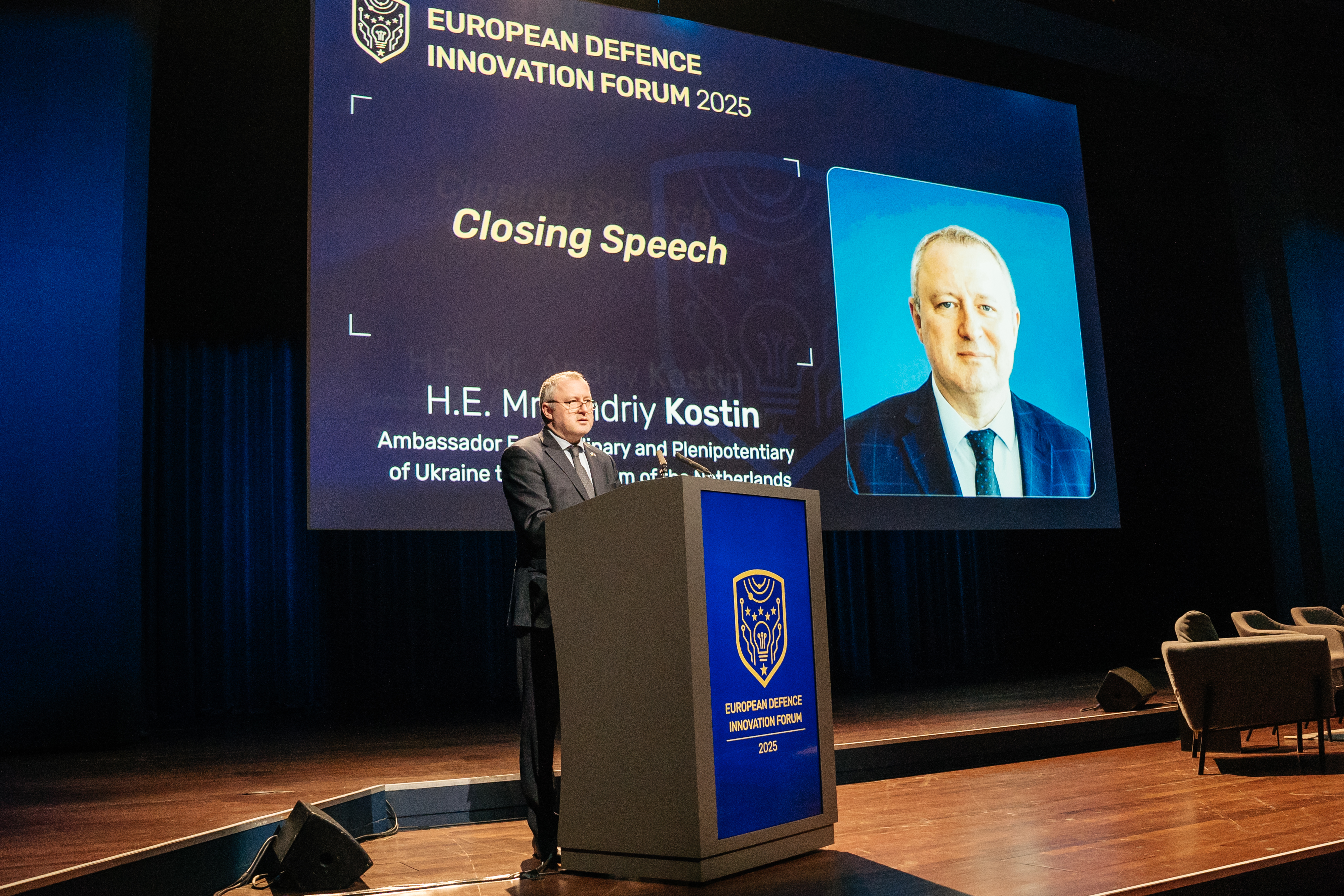 Andriy Kostin (Ambassador of Ukraine to the Kingdom of the Netherlands)
Andriy Kostin (Ambassador of Ukraine to the Kingdom of the Netherlands)
The Ministry of Defence of Ukraine closed the event by expressing deep gratitude to the Dutch government, businesses and volunteers. The address underlined the vital importance of unity, innovation and co-development between Ukraine and Europe, noting that every joint project strengthens both Ukraine’s resilience and Europe’s security.
The overall conclusion was optimistic: Europe has the talent, technology and industrial base to lead in next-generation defence capabilities: if cooperation, innovation and speed remain at the centre of its strategy.
With this milestone event in The Hague, EDIF 2025 has laid the foundation for deeper collaboration and faster innovation. The journey continues: the next edition of the European Defence Innovation Forum will take place in 2026, building on the momentum and partnerships established this year.
Slava Ukraini!